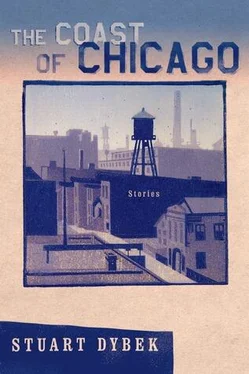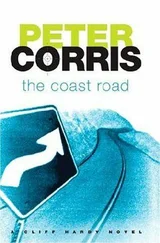We met at the ice cream factory where I worked the summer between high school and college. She was the first girl I was serious about. I felt too young to be serious — a feeling I kept secret.
She kept me a secret from her uncle Tassos.
Her uncle was the one who had brought her over and got her the job at the ice-cream factory. She worked on the bar tank line with the other, mostly foreign women, sitting before a conveyor belt and packing Popsicles, Fudgsicles, Creamsicles, and Dreamsicles into freezer cartons. At the end of the day her hands were stiff with cold and her fingers stained the colors of whatever flavors had been run.
Her uncle Tassos worked on the ore boats out of Calumet Harbor. He would be away for two-week runs, and then off work for five days straight. When he was back home the only place I would get to see her was at the factory. I was still living with my parents and began to feel ashamed for not having my own place to take her. When Uncle Tassos left with the barges again — as safely off somewhere around Petoskey as if he’d sailed for Peloponnesus — she’d sneak me up to her one-room apartment that overlooked Halsted Street.
It was an old neighborhood that Mayor Daley, despite his campaign promises, was preparing to demolish to make way for a new university. But life went on that summer as it always had — daily newspapers printed in strange alphabets; nuts, cheeses, dried cod sold in the streets; the scent of crushed lemons from the bakery that made lemon ice; Greek music skirling from the restaurant downstairs. And once she’d let me in I wouldn’t leave until morning, but sometimes, in the middle of the night, I’d have to get up and pace while the dark room filled with laughter.
A couple of months after he’d married Joan, the phone rang in the middle of the night. The phone was in the kitchen and seemed to ring through the dark apartment like an alarm. He had always been afraid of phone calls at that hour. They triggered a dread in him that something terrible had happened, and he almost believed that if he didn’t answer, whatever catastrophe had occurred might be undone by morning. But this time he leapt to answer. It was better to get the news firsthand than to listen to his new wife answer the phone and then break into sobs.
“Hello,” he said, trying to sound composed.
“Yellow. Guess who?”
“I know who.”
“Guess what?”
“I give.”
“I’m tripping on MDA.”
“Oh.”
“‘Ecstasy,’ you know, the ‘Love Drug.’ Whatsamatter? You don’t read Newsweek and keep up?”
“My subscription ran out.”
“It’s a body rush. Incredibly erotic. I’m so horny — climbing the walls.”
“Nice of you to call and let me know.”
“It heightens memory, too. Hey, I’m still a little nuts about you. Is that Joanie flushing the toilet?”
“Yes.”
“She probably wants to know who’s on the phone.”
“Exactly right.”
“That’s why you’re talking to me in that funny flat voice. So quiet. Not saying my name. You didn’t use to be such a monosyllabic type of guy. Well, at least say something.”
“Like what?”
“Like what are you wearing? Cute little seersucker pajamas?”
“Look, I should hang up.”
“You’re supposed to talk people down when they’re tripping. I could be in terrible trouble here. Remember that one time we did mushrooms? The night you said I turned into Cleopatra. You said it was the pinnacle.”
“We were in college, for chrissake.”
“I thought I’d try something like that one more time, you know, like they shout at the end of Basie’s ‘April in Paris’—‘One more time!’—a tribute to the old days. I liked myself better then. Liked you better, too.”
“I don’t want to be the one to hang up, okay?”
“You never did. Guess what I’m wearing? Guess how I look on the other end of this telephone line. Listen, I’ll rub the phone down my body. See if you can hear…did you hear anything?”
“No.”
“Well, press your ear against the receiver. You didn’t hear that? You didn’t hear hair? What part of my body do you think you’re talking to right now? Say something soft and breathy. Blow warm air into the phone. Pretend you’re a mad breather.”
“It’s late. You should go to sleep.”
“Come over.”
“I can’t.”
“Baby, come see me. Tell her it’s a buddy with a flat tire.”
“I can’t.”
“Baby, oh baby, baby, baby, baby, I need you so much tonight. Baby, you gotta fix my flat tire.”
“It’s 3 a.m.”
“Please. Don’t make me beg. Come over…we’ll do everything .”
“How many other people have you called besides me?”
“Only one.”
Between job interviews, I’d wander around the Art Institute, killing time. The Art Institute was on the park side of Michigan Avenue, across the street from the towering office buildings in which the employment agencies were situated. It felt soothing to drift among the paintings. Several had begun to feel like old friends. Visiting them beat sitting over a lukewarm coffee in some greasy spoon, spending another afternoon studying not only the Want Ads, but the faces of the others at the counter who sat nursing their coffees as they grimly studied the Want Ads too. By now, I spotted their faces everywhere. I’d become aware of an invisible army armed with Want Ads, pounding the pavement, knocking on doors, hoping opportunity would answer. It was an army without the consolation of camaraderie. I’d learned to recognize its unconscious salutes, its uniforms and ranks and outposts — personnel offices, coffee shops, and stands of public phones — from which its lonely campaigns were launched. I’d been looking for a job for over a month and was beginning to feel desperate.
The Art Institute was my base of operations. Its public phones were usually empty, and its restroom was modern and clean with a full-length mirror perfect for last minute inspections before heading out on an interview.
My first couple weeks of job hunting, I’d hung out at the Public Library. Unlike the Art Institute, admission to the library was free. But the longer I’d gone without work, the more an old dread crept back into me: a feeling from high school, a memory of dreary Saturdays when, loaded with note cards for research papers that I was hopelessly behind on, I’d enter the Public Library only to end up wandering around lost, wasting the day. I remembered how, the summer before I’d started high school, my father had insisted that I spend a week at the library researching professions and the biographies of successful tycoons so that I’d have some sense of direction during my high school years and not live up to his nickname for me: The Dreamer. And I recalled how rather than doing what he’d asked, I’d only pretended to go to the library and instead had spent the money he’d given me at movies and record shops. Now, his dire predictions seemed to be coming true. My money was running out; I couldn’t find a job. After a week of hanging around the library, I began to recognize the same set of regulars — people who carried their possessions in bags, or wore them all at once, who seemed to be living in the library stacks. Soon, I expected them to begin winking at me, giving me secret greetings I didn’t want to recognize.
The public phones in the Public Library were always busy. In the old restrooms fluids pooled on the cracked terrazzo, and the homeless hung around inside, smoking, sometimes washing out their clothes in the plugged sinks. Even on the brightest days I began to notice the gray, gloomy cast of the marble corridors and flights of stairs. The reading rooms, dominated by the glow of green-shaded desk lamps, seemed worn as old railroad stations. There was a smell of musty pulp, of thumbed cloth covers, of too much print. At the long reading tables I could spot the displaced and dispossessed drowsing over enormous tomes or reading aloud to themselves as if engaged in debates with the complete works of Marx and Engels, Spengler, Tolstoy, Schopenhauer, while outside the windows cooing pigeons paced back and forth along the crusted slate ledges.
Читать дальше












